[vc_row u_row_style=”0″ u_row_paralax=”0″ u_row_scheme=”0″][vc_column width=”2/3″][vc_single_image image=”11971″ img_size=”full”][vc_tta_accordion style=”outline” shape=”square” color=”mulled-wine” spacing=”3″ c_position=”right” active_section=”1″ no_fill=”true”][vc_tta_section title=”Description” tab_id=”1530764492268-b68bb106-a3114d2a-dfcba39c-a0a4136d-3bcd179b-5a33″][vc_column_text]The Postgraduate Basic Education Master’s study program has permanent lecturers, with doctoral academic qualifications with expertise in teaching lectures in the Basic Education study program. The academic work of the Basic Education Study Program lecturers is classified as high; this can be seen from the results of research and community service both locally, regionally, and nationally. On average, all teaching lecturers in the Basic Education Study Program have research in the form of National Grant, National Education, Fundamental, Postgraduate Grants, and others per year. In the field of community service, the lecturers also have program of P2M (community service). This shows that the quality of human resources, especially lecturers in the Basic Education Study Program, is very proactive as a PNBP producer. The research strengths of the Masters in Basic Education lecturers contributed greatly to Jakarta State University’s research.
Currently, there are 397 students in Master’s Program of Basic Education. Students come from lecturers from various regions in Indonesia, namely Aceh, Jakarta, West Java, Central Java, East Kalimantan, West Kalimantan, Central Kalimantan, Bengkulu, South Sulawesi, North Sumatera, West Sumatera, South Sumatera, Lampung, Southeast Sulawesi, West Nusa Tenggara, West Papua, Papua. The Basic Education Study Program received an Accreditation Rating by BAN-PT is “A” in 2016 according to the decree Naumber 1750 / SK / BAN-PT / Akred. / M / VIII / 2016.[/vc_column_text][/vc_tta_section][vc_tta_section title=”Lecturers” tab_id=”1530764492269-a97477e6-b1404d2a-dfcba39c-a0a4136d-3bcd179b-5a33″][vc_column_text]
| NO | NAME | STATUS |
| 1 | Dr. Otib Satibi Hidayat, M.Pd. | Lecturer |
| 2 | Dr. Yurniwati, M.Pd. | Lecturer |
| 3 | Prof. Dr. Arifin Maksum, M.Pd. | Lecturer |
| 4 | Dr. Hj. Herlina, M.Pd. | Lecturer |
| 5 | Dr. Ika Lestari, S.Pd, M.Si. | Lecturer |
| 6 | Drs. Erry Utomo, M.Ed., Ph.D. | Coordinator |
[/vc_column_text][/vc_tta_section][vc_tta_section title=”Objective” tab_id=”1530764938902-c7584f75-650d4d2a-dfcba39c-a0a4136d-3bcd179b-5a33″][vc_column_text]
- Develop the Postgraduate Basic Education Study Program students with the skills and competencies required by prospective academics (Primary Teacher Education/PGSD lecturers), primary/junior secondary school teachers who are researchers, who have deep mastery in one of the basic education fields of study.
- Improve the quality of the Postgraduate Basic Education Study Program in educational activities, research, and community service.
- Develop the Postgraduate Basic Education students by deepening the science of Basic Education on a national and international scale.
- Develop the quality of the Basic Education Study Program in a broader spectrum, by linking the Basic Education sector with other educational disciplines.
- Develop student competencies in formulating solutions to Basic Education problems using scientific reasoning.
[/vc_column_text][/vc_tta_section][vc_tta_section title=”Learning Outcome” tab_id=”1530765068160-6718c317-6b264d2a-dfcba39c-a0a4136d-3bcd179b-5a33″][vc_column_text]
- Able to solve basic education problems based on pedagogy theory, literacy, information technology through scientific methods with an interdisciplinary or multidisciplinary approach based on academic values, norms, and ethics;
- Able to develop pedagogy theory, literacy, benefits of information technology in Primary Education to produce solutions for improving the quality of public life, nationality, and state through an interdisciplinary or multidisciplinary approach;
- Able to apply logical, critical, systematic, and innovative thinking in Primary Education based on scientific rules, procedures, and ethics to improve the profession of Primary Education that has social sensitivity and care for society and the environment.
- Able to implement basic education problem solutions that suit the needs of basic education development through proven research and novelty at the national level;
- Able to apply innovative learning by applying concepts and principles of didactic-pedagogical in Basic Education by utilizing the science and technology-oriented towards life skills and contributing to the improvement of the quality of people’s lives;
- Able to apply professionalism on an ongoing basis in the field of Primary Education by researching reflective and evaluative measures;
- Able to disseminate the results of Primary Education results are current with the inter and multi-disciplinary approach recognized by the Elementary Education community at the national and international level.
[/vc_column_text][/vc_tta_section][vc_tta_section title=”Course” tab_id=”1530765064040-caece16b-0d224d2a-dfcba39c-a0a4136d-3bcd179b-5a33″][vc_column_text]General Course
| Code | Courses | Csh |
| 99008113 | Philosophy of Science | 3 credits |
| 99008123 | Research Methodology | 3 credits |
| 99008133 | Statistics | 3 credits |
| 99008142 | Indexed Scientific Article Writing | 3 credits |
Expertise Course
| Code | Courses | CSH |
| 99188123 | Development of Elementary School Curriculum Based on Holistic and Integrated Approach | 3 credits |
| 99188133 | Elementary School Practice Research and Teacher Education | 3 credits |
| 99188143 | Authentic Assessment | 3 credits |
| 99188153 | Education of Creative Art based on Cultural Background | 3 credits |
| 99158183 | New Orientation in Education Psychology | 3 credits |
| 99158193 | Basic Education Colloquium
| 3 credits |
Elective Courses
| KODE | MATA KULIAH | CSH |
| 99188213 | Mathematics Learning | 3 credits |
| 99188223 | Mathematics Learning Advance | 3 credits |
| 99188233 | Science Learning | 3 credits |
| 99188243 | Science Learning Advance | 3 credits |
| 99188253 | Social Learning | 3 credits |
| 99188263 | Social Learning Advance | 3credits |
| 99188273 | Indonesian Language Learning | 3 credits |
| 99188283 | Indonesian Language Learning Advance | 3 credits |
Note: Select 2 from elective courses with the same field. | ||
Matriculation Courses**
| Code | Courses | CSH |
| 99188023 | The Foundation of Education Science* | 3 credits |
Note: * implemented before semester 1 lecture
Thesis
| Code | Courses | CSH |
| 99008918 | Thesis | 8 credits |
[/vc_column_text][/vc_tta_section][vc_tta_section title=”Accreditation” tab_id=”1530765062659-7d6fba46-3e8e4d2a-dfcba39c-a0a4136d-3bcd179b-5a33″][vc_column_text]The Master’s Program in Basic Education Study Program accredited “A” at National Accreditation Organization for Higher Education, Decree Number 10502/SK/BAN-PT/Ak-PPJ/M/VIII/2021, valid until August 27, 2026.[/vc_column_text][/vc_tta_section][vc_tta_section title=”Curriculum” tab_id=”1530765059776-21bdf663-b42a4d2a-dfcba39c-a0a4136d-3bcd179b-5a33″][vc_column_text]The foundation of postgraduate curriculum development of Universitas Negeri Jakarta (UNJ), namely (a) Law No. 12 of 2012 on Higher Education, (b) Presidential Regulation No. 8/2012 on Indonesia’s National Qualification Framework (KKNI), (c) Permendikbud No. 73/2013 on The Implementation of KKNI in Higher Education, (d) Government Regulation No. 4/2014 on The Implementation of Higher Education and Higher Education Management, and (e) and Permendikbud No. 03 of 2020 on National Standards of Higher Education. Referring to the above policy, the master’s program curriculum implements KKNI level 8 (eight).
The content of the UNJ Postgraduate Master’s curriculum is encompassed in Graduate Learning Achieves (CPL), which includes aspects of attitude, general skill, special skill, and knowledge formulated based on SNPT The Year 2020 and descriptor KKNI level 8 (eight)). Graduate learning achievements (CPL)are spelled out into courses specific to the course, covering attitude, knowledge, general skills, and special skills.
The Master’s Study Program curriculum was developed based on outcome-based education (OBE) of international standards. The curriculum developed is oriented towards the occupational/professional map within the Indonesian National Qualification Framework (KKNI) of the field of expertise or science of each Study Program that can be equalized with international qualifications.
The UNJ Postgraduate Curriculum contains several courses grouped into matriculation courses, General Subjects (Courses)s, major courses/courses, basic educational courses, and choose courses.
Postgraduate issued a Certificate of Postgraduate Assistance (SKPI) or diploma supplement referring to the Regulation of the Minister of Research, Technology, and Higher Education No. 59 of 2018 on Diploma, Certificate of Competency, Certificate of Profession, Degree, and Procedure for Writing a Degree in Higher Education. SKPI contains information on graduates’ activeness in the academic field, the social attitudes of graduates, and the qualifications of graduates following the level of the Indonesian National Qualification Framework (KKNI). SKPI is issued after validation, and the student is declared to have graduated from a study program at The Graduate School of Jakarta State University.
The qualifications expected from graduates of UNJ Postgraduate Master Program are following KKNI level 8 namely: (1) Able to develop pedagogy theory, literacy, benefits of information technology in educational technology to produce solutions that are in order to improve the quality of public life, nationality and state through an interdisciplinary or multidisciplinary approach; (2) Able to apply logical, critical, systematic, and innovative thinking in their field based on scientific rules, procedures and ethics in order to improve the profession of education and non-education that has social sensitivity and care for the community and the environment; (3) Able to solve educational and non-educational problems based on scientific methods with an interdisciplinary or multidisciplinary approach that internalizes academic values, norms, and ethics; (4) Able to implement educational and non-educational problem solutions that are following the needs of science and technology development through proven research and novelty at the national and international level; (5) Able to apply innovative learning by applying concepts and principles of didactic-pedagogical by utilizing science and technology-oriented towards life skills and contributing to the improvement of the quality of people’s lives; (6) Able to apply professionalism on an ongoing basis in his field of expertise or knowledge by conducting research as reflective and evaluative measures; (7) Able to disseminate the results of studies in the field is current with an inter and multi-disciplinary approach recognized by the scientific community at the national and international level. To achieve these graduates’ qualifications, the learning process at Postgraduate UNJ is conducted in the form of face-to-face lectures and/or blended learning, seminars, practicum, response, research, studio practices, workshop practices, or field practices.
The study assessment at UNJ Postgraduate includes assessing the process and assessment of student learning results to meet the achievements of graduate learning. Assessment techniques used are observation, participation, projects, rallies, assignments, written tests, or oral tests, which are student portfolios.
The composition of courses for Master’s program as follows.
Table 1. Disseminate of Study Loads for Background Bachelor of Education Program
| № | Courses | CSH |
| 1 | General Courses | 12 |
| 2 | Expertise Courses of Specific Study Programs | 18-24 |
| 3 | Elective Courses | 3 |
| 4 | Thesis | 8 |
| Amount | 41– 47 |
CSH = Courses Semester Hours
Table 2. Disseminate of Study Loads for Background Bachelor’s Program Non-Education
| № | Courses | CSH |
| 1 | Matriculation Courses | 3 |
| 2 | General Courses | 12 |
| 3 | Expertise Courses of Specific Study Programs | 18-24 |
| 4 | Elective Courses | 3 |
| 6 | Thesis | 8 |
| Amount | 44– 47 |
[/vc_column_text][/vc_tta_section][vc_tta_section title=”Activities” tab_id=”1619963547298-ad8c7f31-c393179b-5a33″][vc_column_text]
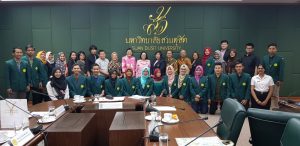
Field Study activities and discussions at Suan Dusit Rajabhat University
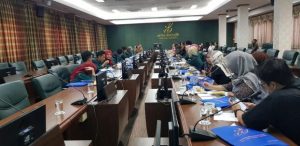
Field Study activities and discussions at Suan Dusit Rajabhat University
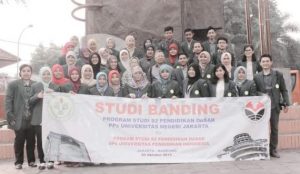
Comparative Study to UPI Bandung Basic Education Study Program
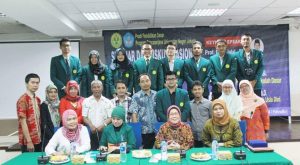
National Seminar for Postgraduate Basic Education
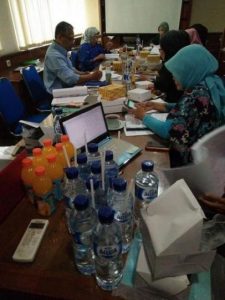
Basic Education Proposal Seminar Exam Activities
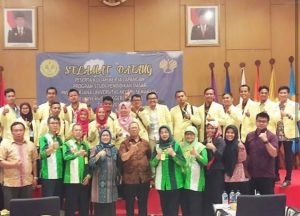
Field Study Master’s Program Visit of Semarang State University in Postgraduate of Master’s Program Basic Education Jakarta State University
[/vc_column_text][/vc_tta_section][vc_tta_section title=”Achievement” tab_id=”1619963632936-eb07ccd7-049a179b-5a33″][/vc_tta_section][/vc_tta_accordion][/vc_column][vc_column width=”1/3″][vc_cta h2=”Master Program”]
- Educational Technology
- Physical Education
- Language Education
- Environmental Education
- Early Childhood Education
- Education Management
- Environmental Management
- Educational Research and Evaluation
- Basic Education
- Applied Linguistics
- History Education
[/vc_cta][vc_cta h2=”Doctoral Program”]
- Educational Technology
- Physical Education
- Applied Linguistics
- Demography and Environmental Education
- Early Childhood Education
- Educational Management
- Educational Research and Evaluation
- Basic Education
- Management
[/vc_cta][/vc_column][/vc_row]
